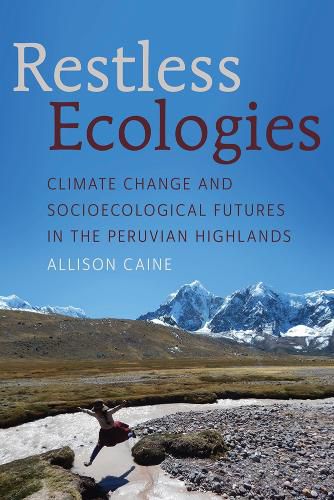Readings Newsletter
Become a Readings Member to make your shopping experience even easier.
Sign in or sign up for free!
You’re not far away from qualifying for FREE standard shipping within Australia
You’ve qualified for FREE standard shipping within Australia
The cart is loading…






In the high Andean grasslands 4,500 meters above sea level, Quechua alpaca herders live on the edges of glaciers that have retreated more rapidly in the past fifty years than at any point in the previous six millennia. Women are the primary herders, and their specialized knowledge and skill is vital to the ability of high-elevation communities to survive in changing climatic conditions. In the past decade, however, these herders and their animals have traversed a rapidly shifting terrain.
Drawing on the Quechua concept of k'ita, or restlessness, Allison Caine explores how herders in the community of Chillca in the Cordillera Vilcanota mountain range of the southeastern Peruvian Andes sense and make sense of changing conditions. Capricious mountains, distracted alpacas, and wayward children deviate from their expected spatial and temporal trajectories. When practices of sociality start to fall apart-when animals no longer listen to herders' whistles, children no longer visit their parents, and humans no longer communicate with mountains-these failures signal a broader ecological instability that threatens the viability of the herder's world.
For more than two years, the author herded alongside the women of the Cordillera Vilcanota, observing them and talking with them about their interactions with their animals, landscapes, and neighbors. Emphasizing the importance of Indigenous knowledge and traditional ecological practices, Caine argues that Quechua understandings of restlessness align with and challenge broader theoretical understandings of what it is to be vulnerable in a time of planetary crisis.
$9.00 standard shipping within Australia
FREE standard shipping within Australia for orders over $100.00
Express & International shipping calculated at checkout
In the high Andean grasslands 4,500 meters above sea level, Quechua alpaca herders live on the edges of glaciers that have retreated more rapidly in the past fifty years than at any point in the previous six millennia. Women are the primary herders, and their specialized knowledge and skill is vital to the ability of high-elevation communities to survive in changing climatic conditions. In the past decade, however, these herders and their animals have traversed a rapidly shifting terrain.
Drawing on the Quechua concept of k'ita, or restlessness, Allison Caine explores how herders in the community of Chillca in the Cordillera Vilcanota mountain range of the southeastern Peruvian Andes sense and make sense of changing conditions. Capricious mountains, distracted alpacas, and wayward children deviate from their expected spatial and temporal trajectories. When practices of sociality start to fall apart-when animals no longer listen to herders' whistles, children no longer visit their parents, and humans no longer communicate with mountains-these failures signal a broader ecological instability that threatens the viability of the herder's world.
For more than two years, the author herded alongside the women of the Cordillera Vilcanota, observing them and talking with them about their interactions with their animals, landscapes, and neighbors. Emphasizing the importance of Indigenous knowledge and traditional ecological practices, Caine argues that Quechua understandings of restlessness align with and challenge broader theoretical understandings of what it is to be vulnerable in a time of planetary crisis.